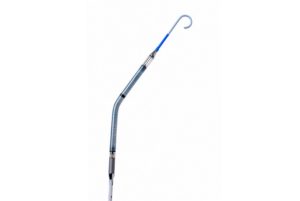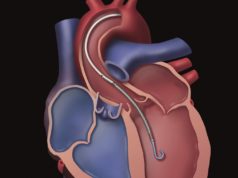
Results of a new per-protocol analysis of the ST-segment Elevation Myocardial Infarction Door-To-Unload (STEMI DTU) pilot trial data show significantly reduced infarct size in patients who received left ventricular (LV) unloading using the Impella CP (Abiomed) for 30 minutes prior to their percutaneous coronary intervention (PCI) compared to patients who received LV unloading followed by immediate PCI.
The data were presented during the 2022 Transcatheter Cardiovascular Therapeutics meeting (TCT, 16–19 September, Boston, USA) by Navin K Kapur (Tufts Medical Center, Boston, USA) and the principal investigator for the STEMI DTU pivotal randomised controlled trial.
The analysis compared infarct size in 32 patients from the STEMI DTU pilot trial who met all inclusion and exclusion criteria. All patients experienced an anterior STEMI and completed one of two treatment protocols—LV unloading with Impella CP followed by immediate PCI (n=15) or LV unloading with Impella CP for 30 minutes prior to delayed PCI (n=17). Cardiac magnetic resonance (CMR) imaging performed three-to-five days after PCI was used to determine infarct size (IS) normalized to the area at risk (AAR). Results showed that the infarct size normalized to the area at risk was significantly lower in the delayed PCI group compared to the immediate PCI group (IS/AAR: 47±16 vs. 60±16, p=0.02), which translates to a 22% relative and 13% absolute reduction in IS/AAR.
“Results from this analysis are early, but promising, indicating that in STEMI patients, unloading the left ventricle with Impella CP for 30 minutes and delaying PCI could potentially help improve patient outcomes by reducing damage to the heart muscle and helping prevent heart failure,” said Kapur.
J-PVAD registry
Also at TCT, Abiomed announced the findings of two analyses from the J-PVAD registry. This includes the results of a three-year, investigator-led study of all Impella-supported patients treated at 109 hospitals in Japan, which shows a 30-day survival rate of 77% for patients with cardiogenic shock due to myocarditis.
The study is an update to a 2020 interim analysis, and examined 143 consecutive patients with cardiogenic shock due to myocarditis who received Impella support or Impella plus VA ECMO support, known as ECpella. These patients are included in the J-PVAD registry, a registry conducted by 10 Japanese professional societies, including the Japanese Circulation Society (JCS). The results demonstrated a 77% survival at 30 days for these patients. A previous analysis of myocarditis patients who only received VA ECMO support found 48% survival at 30 days (Journal of Heart and Lung Transplantation, 2021).
“These findings further demonstrate the potential of increasing native heart recovery in myocarditis patients through the use of Impella, which is an important consideration given the limited number of heart transplants,” said lead investigator Koichi Toda (Osaka University Graduate School of Medicine, Osaka, Japan).
“Myocarditis is a growing epidemic in the COVID-19 era. It is exciting to see data from this study demonstrates the potential for Impella support to improve patient outcomes in this very sick patient population,” said Masahiro Ono (Methodist Healthcare in San Antonio, USA).
Further analysis from the J-PVAD registry, looking at 30-day survival rates for AMI cardiogenic shock (AMICS) patients, examined 293 consecutive Impella-supported AMICS patients and demonstrated 81% survival at 30 days, which compares favourably to historical cardiogenic shock survival rates without Impella, which are approximately 50%.
“The results of this study demonstrate that when Impella is used and best practices are followed, it is possible to achieve heart recovery and greater than 80% survival rates for patients with AMI cardiogenic shock,” said lead investigator Junya Ako (Kitasato University Hospital, Kanagawa, Japan).










